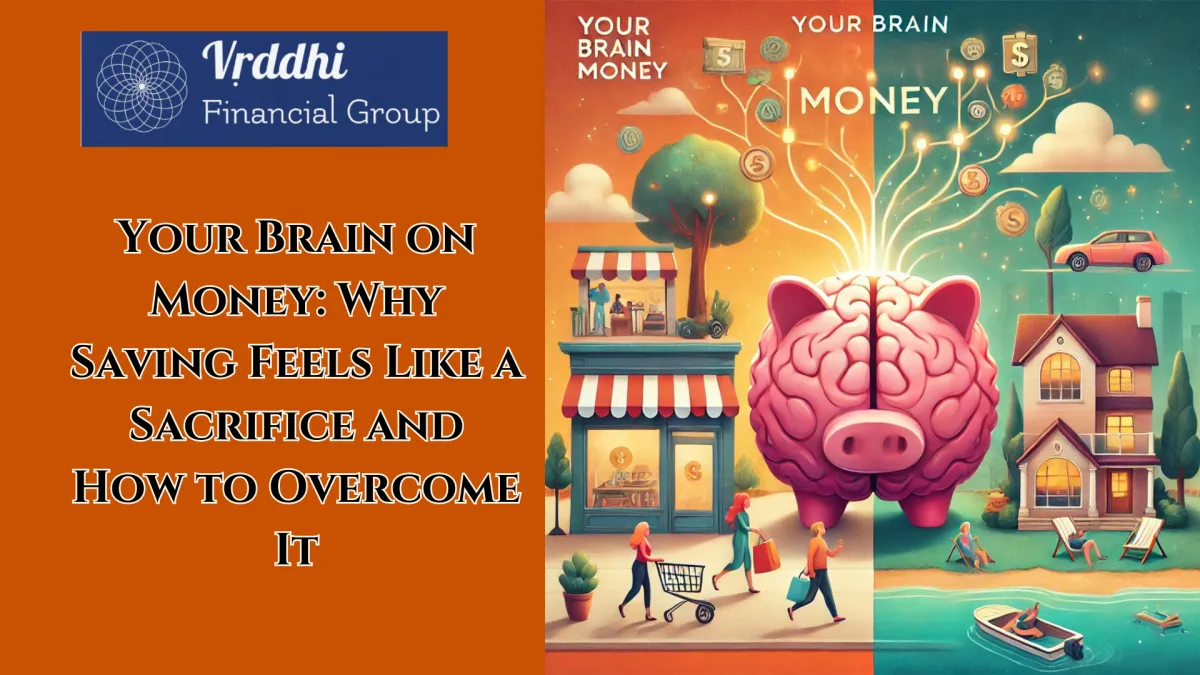
Why Saving Feels Like a Sacrifice and How to Overcome It
Have you ever felt like saving money is just denying yourself happiness today? You’re not alone. Many of us focus on what we’re missing out on in the present when we set money aside for the future. It feels like we’re throwing money away instead of spending it on things that bring us immediate joy.
And when it comes to retirement planning, it gets even more stressful. The future feels distant, abstract, and uncertain. So, to avoid that stress, we push it aside, convincing ourselves that we’ll deal with it "later." But this avoidance prevents us from making choices that are in our long-term best interest.
So here’s the big question:
What is more important—your happiness right now or your happiness 10 years from now?
The tricky part? There’s no correct answer.
The Brain’s Natural Bias for the Present
Our brains evolved to prioritize short-term rewards. That’s why it’s so much easier to enjoy a night out with friends than to put that money into a retirement account. Studies show that our brains light up more when we think about immediate rewards than when we consider long-term benefits.
Think of your brain as having different “friends” influencing your decisions:
The Thinking Brain : It’s the logical planner, saying, “Save now so you can enjoy financial freedom later.”
The Habit Brain : It prefers doing things the way they’ve always been done—spending money how you always have.
The Reward Brain : It seeks instant gratification—“Oh look, there’s a new gadget I want!”
Because of this bias, $10 today feels more real than $100 a year from now—even though logically, we know that saving is better in the long run.
How to Trick Your Brain into Saving More
The good news? You can work with your brain instead of against it. Here are some powerful ways to make saving feel more rewarding:
1. Make Your Future Feel More Real
A fascinating study showed that when people saw digitally aged pictures of themselves while signing up for retirement plans, they were more motivated to save. Why? Because suddenly, their future self wasn’t just an abstract idea—it became real.
Try this:
Imagine yourself at 60 years old—where do you live? What kind of lifestyle do you want?
Instead of thinking, “I’m saving for retirement,” think, “I’m saving for my dream lake house” or “I’m investing in future adventures.”
2. Start Small and Build Momentum
One of the biggest mistakes people make is thinking they need to save huge amounts right away. Start with just $1 a day. It’s infinitely better than $0. Over time, increasing your savings by just a little will make a huge difference.
Think of it as building a habit, not a sacrifice. A year from now, you might feel comfortable increasing it to $300 a month—and that’s how financial freedom starts.
3. Automate Your Savings
Take the decision-making out of it. Set up an automatic transfer from your checking account to your savings or retirement fund. If the money moves before you see it, you won’t miss it.
4. Reward Yourself for Progress
Remember, your brain loves instant gratification. So, set up small rewards for hitting savings milestones:
Saved your first $500? Treat yourself to your favorite meal.
Reached $5,000? Plan a small weekend getaway.
5. Focus on the Freedom, Not the Sacrifice
Saving isn’t about denying yourself—it’s about creating choices. The more you save, the more freedom you have in the future to live life on your terms.
Final Thought: Small Steps Lead to Big Wins
You don’t need to figure it all out today. Just take one tiny step in the right direction. The key to happiness—both now and in the future—isn’t about choosing one over the other. It’s about finding the right balance between living today and preparing for tomorrow.
And when you take control of your money, you take control of your future. 💡💰
A simple yet powerful way to visualize the relationship between managing responsibilities and building wealth.Click the below button to know more.
Don’t leave your loved ones in uncertainty. Start planning today, and ensure that your wishes are followed and your legacy is protected. You’ve worked hard to build your life, now let’s protect it for the ones you care about most.
When it comes to paying off debt, two popular strategies are the Debt Snowball and Debt Avalanche methods. choosing the right one depends on your personal preferences and financial situation. Click the below button to know more.
The ideas for a comfortable retirement have changed a lot. Understanding how those changes affect you could be the difference between living your dreams and living a long life of uncertainty.Click the below button to know more.
